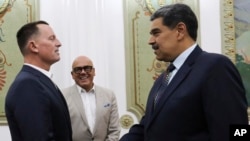Six Americans who had been detained in Venezuela in recent months were freed by the government of President Nicolas Maduro after he met Friday with a senior Trump administration official.
U.S. President Donald Trump and his envoy for special missions, Richard Grenell, announced the release of the six men on social media. Grenell posted on X a photo showing him and the men aboard an aircraft.
Grenell's trip to Venezuela, according to the White House, was focused on Trump's efforts to deport Venezuelans back to their home country, which currently does not accept them, and on the release of the detained Americans.
"We are wheels up and headed home with these 6 American citizens," Grenell wrote on X. "They just spoke to @realDonaldTrump and they couldn't stop thanking him."
The visit by Grenell came as a shock to many Venezuelans who hoped that Trump would continue the "maximum pressure" campaign he pursued against the authoritarian Venezuelan leader during his first term.
Mauricio Claver-Carone, Trump's special envoy to Latin America, previewed Grenell's visit to Caracas in a conference call with journalists on Friday. He said Grenell, who served as U.S. ambassador to Germany and acting director of national intelligence during Trump's first term, was in Venezuela on a "very specific mission" that in no way detracts from the Trump administration's goal of restoring democracy in the South American nation.
"I would urge the Maduro government, the Maduro regime in Venezuela, to heed special envoy Ric Grenell's message," said Claver-Carone, himself a former top national security aide to Trump during his first administration. "Ultimately there will be consequences otherwise."
The visit comes less than a month after Maduro was sworn in for a third six-year term despite credible evidence that he lost last year's election by a more than 2-to-1 margin. The U.S. government, along with several other Western nations, does not recognize Maduro's claim to victory.
Venezuelan state television aired footage of Grenell and Maduro speaking in the Miraflores Palace in Caracas, the capital, and said the meeting had been requested by the U.S. government.
Signing an executive order in the Oval Office on Friday, Trump was asked if Grenell being filmed meeting with Maduro lent legitimacy to an administration that the Trump White House hasn't official recognized.
"No. We want to do something with Venezuela. I've been a very big opponent of Venezuela and Maduro," Trump responded. "They've treated us not so good, but they've treated, more importantly, the Venezuelan people, very badly."
Some Republicans criticized the visit.
"This is terrible timing," said Elliott Abrams, who served as special envoy to Venezuela and Iran during the first Trump administration. "A meeting with Maduro will be used by him to legitimize his rule and show that the Americans recognize him as president. If the purpose is to deliver a tough message about migration issues, the president could've done that himself. There was no need to send someone to Caracas."
Among those detained are as many as 10 Americans. Neither the White House nor Maduro's government immediately released the names of the six who were freed Friday.












